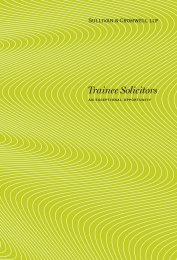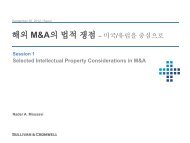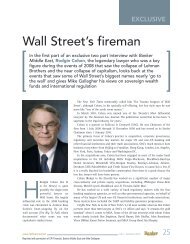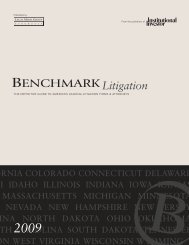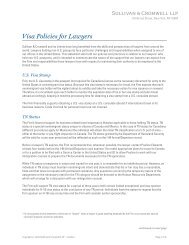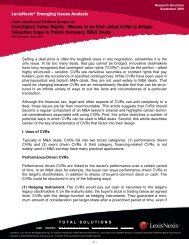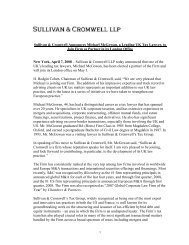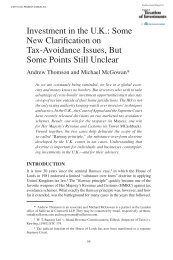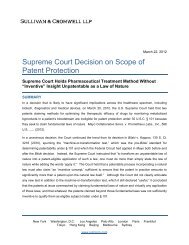CFTC Adopts Internal Business Conduct Rules - Sullivan & Cromwell
CFTC Adopts Internal Business Conduct Rules - Sullivan & Cromwell
CFTC Adopts Internal Business Conduct Rules - Sullivan & Cromwell
You also want an ePaper? Increase the reach of your titles
YUMPU automatically turns print PDFs into web optimized ePapers that Google loves.
<strong>CFTC</strong> <strong>Adopts</strong> <strong>Internal</strong> <strong>Business</strong> <strong>Conduct</strong><br />
<strong>Rules</strong><br />
March 8, 2012<br />
<strong>CFTC</strong> <strong>Adopts</strong> Final <strong>Rules</strong> on Swap Dealer Major Swap Participant<br />
Recordkeeping and Reporting, Duties, and Conflicts of Interest<br />
Policies and Procedures; Futures Commission Merchant and<br />
Introducing Broker Conflicts of Interest Policies and Procedures;<br />
Swap Dealer, Major Swap Participant and Futures Commission<br />
Merchant Chief Compliance Officer<br />
SUMMARY<br />
On February 23, 2012, the Commodity Futures Trading Commission voted to adopt final rules that<br />
regulate the internal conduct of futures commission merchants, introducing brokers, swap dealers and<br />
major swap participants. These rules impose duties and restrictions on these categories of registered<br />
entities concerning internal conflicts of interest and recordkeeping. Swap dealers, major swap<br />
participants and futures commission merchants must also designate a chief compliance officer who is<br />
charged with establishing and enforcing policies and procedures reasonably designed to ensure<br />
compliance with the Commodity Exchange Act and the regulations promulgated thereunder. The four<br />
types of registered entities must erect firewalls between clearing personnel and trading business<br />
personnel as well as between research personnel and non-research personnel. The final rules relating to<br />
recordkeeping require swap dealers and major swap participants to keep sufficient records to show<br />
general and trade-specific compliance with the Commodity Exchange Act and its regulations. The<br />
Commodity Futures Trading Commission worked closely with commenters and other regulators in drafting<br />
these rules.<br />
New York Washington, D.C. Los Angeles Palo Alto London Paris Frankfurt<br />
Tokyo Hong Kong Beijing Melbourne Sydney<br />
www.sullcrom.com
OPEN MEETING<br />
On February 23, the Commodity Futures Trading Commission (the “Commission” or the “<strong>CFTC</strong>”) held an<br />
open meeting at which it considered adopting five sets of proposed rules relating to the internal conduct<br />
of swap dealers (“SDs”), major swap participants (“MSPs”), futures commission merchants (“FCMs”) and<br />
introducing brokers (“IBs”) that it proposed in November and December of 2010 (such proposed rules<br />
referred to hereinafter as the “Proposed <strong>Rules</strong>”) 1 as well as promulgating a set of proposed rules on the<br />
minimum block sizes for swaps (the “Open Meeting”). At the Open Meeting, the Commission voted three<br />
to two to adopt a final version of the Proposed <strong>Rules</strong> (the “Final <strong>Rules</strong>” or the “<strong>Internal</strong> <strong>Business</strong> <strong>Conduct</strong><br />
<strong>Rules</strong>”) with Commissioners Sommers and O’Malia dissenting. Commissioner Sommers explained in her<br />
opening statement that she would not support the Final <strong>Rules</strong> because, in her opinion, too many of the<br />
provisions do not “make sense or portend to disturbing trends.” 2 Commissioner Sommers specifically<br />
cited the Commission’s determination in the Final <strong>Rules</strong> to eschew substituted compliance for entities<br />
subject to comparable regulation by a prudential regulator. Commissioner Sommers questioned why the<br />
Commission should expend its limited resources on duplicative regulation and whether this approach<br />
would fit accordingly with the extraterritoriality issues under the Dodd-Frank Wall Street Reforms and<br />
Consumer Protection Act (the “Dodd-Frank Act”).<br />
Commissioner O’Malia dissented because, among other reasons, he strongly disapproved of the<br />
rulemaking process. His chief complaint was that the Commission did not properly conduct its costbenefit<br />
analysis. Commissioner O’Malia argued that a list of anticipated costs associated with<br />
implementing the Final <strong>Rules</strong> was necessary under the Office of Management and Budget (the “OMB”)<br />
guidelines. Commissioner O’Malia further stated that the entire Dodd-Frank Act rulemaking process<br />
suffered from the application of “weak standards to analyzing the cost and the benefits of [the<br />
Commission’s] rulemakings.” 3 To that end, Commissioner O’Malia issued a letter to Acting Director<br />
Zients of the OMB requesting that the OMB review the Commission’s cost-benefit analysis conducted in<br />
connection with the <strong>Internal</strong> <strong>Business</strong> <strong>Conduct</strong> <strong>Rules</strong>. 4 In this letter, the Commissioner explained that he<br />
believed “the Commission has failed to carefully and precisely identify a clear baseline against which the<br />
Commission measured costs and benefits and the range of alternatives under consideration in this rule.” 5<br />
The letter referred to examples of how commenters suggested alternatives for the rules and the<br />
Commission dismissed these suggestions without specific justification or just ignored them. As discussed<br />
in detail below, Commissioner O’Malia specifically highlighted the Commission’s refusal to allow SDs and<br />
MSPs to rely on swap data repositories (“SDRs”) to meet their recordkeeping requirements under the<br />
<strong>Internal</strong> <strong>Business</strong> <strong>Conduct</strong> <strong>Rules</strong>. 6 The failure to provide acceptable reasoning for ignoring this<br />
suggested alternative showed, in Commissioner O’Malia’s opinion, that the rulemaking process for the<br />
Final <strong>Rules</strong> did not comply with the guidelines established by the OMB. 7 As of the date of this<br />
memorandum, the OMB has made no public response to the Commissioner’s request. It is unclear what<br />
effect, if any, a review by the OMB would have on the validity of the <strong>Internal</strong> <strong>Business</strong> <strong>Conduct</strong> <strong>Rules</strong>.<br />
<strong>CFTC</strong> <strong>Adopts</strong> <strong>Internal</strong> <strong>Business</strong> <strong>Conduct</strong> <strong>Rules</strong><br />
March 8, 2012<br />
-2-
FINAL RULES<br />
As discussed above, the Proposed <strong>Rules</strong> consisted of five sets of rules proposed in late 2010. The<br />
Commission worked with the Securities and Exchange Commission (the “SEC”); the Board of Governors<br />
of the Federal Reserve; the Office of the Comptroller of the Currency; and the Federal Deposit Insurance<br />
Corporation to finalize the Proposed <strong>Rules</strong>. The Commission also received 114 comment letters directly<br />
related to the Proposed <strong>Rules</strong> and responded accordingly to these comments. In response to the<br />
comment letters and input from the various federal agencies, the Commission determined to make certain<br />
changes between the Proposed <strong>Rules</strong> and the Final <strong>Rules</strong>. Some of these differences are highlighted in<br />
the discussion below. Many of these changes were made in an attempt to harmonize the Proposed<br />
<strong>Rules</strong> with the rules and regulations promulgated by other domestic and foreign regulators, although the<br />
success of this harmonization may be limited.<br />
Significantly, the Commission determined to adopt the term “swaps activities” in its Final <strong>Rules</strong> and to limit<br />
the applicability of the Final <strong>Rules</strong> to these activities. In particular, the Final <strong>Rules</strong> state that the term<br />
“swaps activities” shall mean “a registrant’s activities related to swaps and any product used to hedge<br />
such swaps, including, but not limited to, futures, options, other swaps or security-based swaps, debt or<br />
equity securities, foreign currency, physical commodities, and other derivatives.” 8 This term should limit<br />
the scope of the required risk management programs and recordkeeping under the Final <strong>Rules</strong>, as well<br />
as the duties of the chief compliance officer (“CCO”), discussed below. The Commission has determined<br />
not to further modify the scope of the <strong>Internal</strong> <strong>Business</strong> <strong>Conduct</strong> <strong>Rules</strong> to differentiate between SDs and<br />
MSPs and these two types of entities will be treated identically under the Final <strong>Rules</strong>. Finally, the<br />
Commission rejected “a substituted compliance regime with respect to the [Final <strong>Rules</strong>] for registrants<br />
subject to regulation by a prudential regulator.” 9 The Commission explained in the release accompanying<br />
the Final <strong>Rules</strong> (the “Adopting Release”) that, because SDs and MSPs are Commission registrants, they<br />
should all be subject to consistent regulatory regimes. Further, the <strong>Internal</strong> <strong>Business</strong> <strong>Conduct</strong> <strong>Rules</strong> are<br />
designed to work in tandem with the “external business conduct rules,” adopted on January 11, 2012, to<br />
govern the conduct of SDs and MSPs. 10 These “external business conduct rules” govern the interactions<br />
of SDs and MSPs with their counterparties.<br />
DUTIES OF SWAP DEALERS AND MAJOR SWAP PARTICIPANTS<br />
The Dodd-Frank Act added Section 4s(j) to the Commodity Exchange Act (the “CEA”) which imposes<br />
certain duties on all registered SDs and MSPs. These duties includes the following:<br />
<br />
<br />
<br />
<br />
<br />
Monitoring positions to avoid violations of applicable limits;<br />
Establishing risk management systems;<br />
Disclosing general information concerning swaps to the Commission;<br />
Implementing conflicts-of-interest procedures and polices (discussed above); and<br />
Avoiding actions that result in an unreasonable restraint on trade.<br />
<strong>CFTC</strong> <strong>Adopts</strong> <strong>Internal</strong> <strong>Business</strong> <strong>Conduct</strong> <strong>Rules</strong><br />
March 8, 2012<br />
-3-
As required under Section 4s(j)(7) of the CEA, the Commission has adopted Subpart J of Part 23 of the<br />
regulations in Title 17 of the Code of Federal Regulations (the “CFK Regulations”), 11 as part of the<br />
<strong>Internal</strong> <strong>Business</strong> <strong>Conduct</strong> <strong>Rules</strong>, and that subpart prescribes rules and regulations governing compliance<br />
with the duties enumerated under Section 4s(j) of the CEA.<br />
The <strong>Internal</strong> <strong>Business</strong> <strong>Conduct</strong> <strong>Rules</strong> require an SD or MSP to establish written procedures and policies<br />
with respect to a risk management program. This program, which must be approved by the appropriate<br />
governing body, should monitor and manage the risks associated with swaps activities. In connection<br />
with these policies and procedures, an SD or MSP must establish a risk management unit separate from<br />
its business trading unit with sufficient authority and resources to carry out its requisite duties and<br />
functions. The risk management program of an SD or MSP must take into account and set risk tolerance<br />
limits (and review them quarterly) based on market risk, credit risk, liquidity risk, foreign currency risk,<br />
legal risk, operational risk, settlement risk and any other applicable risks. The <strong>Internal</strong> <strong>Business</strong> <strong>Conduct</strong><br />
<strong>Rules</strong> contain detailed descriptions of these types of risk and describe how the risk management program<br />
should evaluate these risks. The risk management program must also consider risks posed by affiliates. 12<br />
Risk management personnel of an SD or MSP must provide senior management and its governing body<br />
with written reports concerning the risk exposures of the SD or MSP and any changes to its risk<br />
management program and the SD or MSP must furnish this quarterly report to the Commission.<br />
The risk management program of an SD or MSP must include policies and procedures for evaluating the<br />
risks associated with, and approving, new products. These policies and procedures should take into<br />
account whether the new product would materially alter the overall firm-wide risk profile of an SD or MSP.<br />
If the new product would materially alter the risk profile, the governing body must approve the new<br />
product. The new product policy can allow for preliminary approval of a new product at risk levels that are<br />
not material and solely for determining risk management processes for the new product. Under the<br />
<strong>Internal</strong> <strong>Business</strong> <strong>Conduct</strong> <strong>Rules</strong>, the risk management program of an SD or MSP should also include<br />
policies and procedures that relate to its use of central counterparties. The SD or MSP must satisfy all of<br />
the capital and margin requirements established by the Commission or other prudential regulators. In<br />
connection with the risk management program, the <strong>Internal</strong> <strong>Business</strong> <strong>Conduct</strong> <strong>Rules</strong> require that an SD<br />
or MSP establish policies and procedures for its business trading unit that further the objectives of the risk<br />
management program. Moreover, the business trading personnel should be separated from the risk<br />
management personnel.<br />
Pursuant to the <strong>Internal</strong> <strong>Business</strong> <strong>Conduct</strong> <strong>Rules</strong>, an SD or MSP must adopt policies and procedures to<br />
ensure compliance with the position limits established by the Commission, a DCM or an SEF and prevent<br />
improper reliance on exemptions from the position limits. The SD or MSP will be held to a<br />
reasonableness standard in establishing and enforcing policies and procedures to this effect. An SD or<br />
MSP must provide training on position limit compliance to relevant personnel and establish an early<br />
warning system to issue alerts if applicable position limits are in danger of being breached. The <strong>Internal</strong><br />
<strong>CFTC</strong> <strong>Adopts</strong> <strong>Internal</strong> <strong>Business</strong> <strong>Conduct</strong> <strong>Rules</strong><br />
March 8, 2012<br />
-4-
<strong>Business</strong> <strong>Conduct</strong> <strong>Rules</strong> require that an SD or MSP test the effectiveness of these policies and<br />
procedures quarterly, audit them annually in connection with its audit of its risk management program,<br />
and retain all records pertaining to early warnings, violations, tests and audits relating to these policies<br />
and procedures.<br />
An SD or MSP must also establish supervisory systems to monitor the swaps activities carried out by its<br />
officers, employees and agents, as well as a related supervisory structure. The <strong>Internal</strong> <strong>Business</strong><br />
<strong>Conduct</strong> <strong>Rules</strong> require the SD or MSP to establish a business continuity and disaster recovery program, 13<br />
programs for disclosure and inspection of general information required by the CEA or the <strong>CFTC</strong><br />
Regulations, and policies to prevent the adoption of practices that result in the unreasonable restraint of<br />
trade.<br />
CONFLICTS OF INTEREST POLICIES AND PROCEDURES<br />
Section 732 of the Dodd-Frank Act amended the CEA to mandate that the Commission adopt rules that<br />
require FCMs and IBs to implement conflict of interest systems and procedures. Section 731 of the<br />
Dodd-Frank Act amended the CEA to require SDs and MSPs to “establish structural and institutional<br />
safeguards” and “appropriate informational partitions” to separate trading personnel and clearing<br />
personnel. In response to these two amendments to the CEA, the Commission adopted Final Rule 1.71<br />
requiring FCMs and most IBs to adopt conflict-of-interest policies and procedures and Final Rule 23.605<br />
requiring SDs and MSPs to do the same. 14 The Final <strong>Rules</strong> require FCMs, MSPs, SDs and most IBs to<br />
implement policies and procedures that create informational and supervisory firewalls between research<br />
personnel and non-research personnel and between trading business units and clearing units. Under the<br />
<strong>Internal</strong> <strong>Business</strong> <strong>Conduct</strong> <strong>Rules</strong>, trading business personnel at an SD or MSP are prohibited from<br />
influencing a customer’s decision (or the decision of an affiliated clearing member of a DCO to accept a<br />
customer) to use the clearing services of an affiliated clearing member of a DCO. Similarly, an FCM is<br />
prohibited from allowing an affiliated SD or MSP to influence the decision of a customer to use the<br />
clearing services of an FCM or the decision of an FCM to accept a customer. FCMs must also prohibit<br />
trading business personnel from inappropriately influencing research reports or research analysts.<br />
Separations Between Affiliated Clearing Units and <strong>Business</strong> Trading Units<br />
The Proposed <strong>Rules</strong> would have broadly defined “business trading unit” to include any person that<br />
performs or “is involved in any pricing, trading, sales, marketing, advertising, solicitation, structuring, or<br />
brokerage activities.” 15 In the Final <strong>Rules</strong>, the Commission changed this definition to exclude personnel<br />
who are not directly involved in actual trading activities, such as legal, compliance, human resources, risk<br />
management, operations and other support functions, but would include personnel who “directly perform<br />
or exercise supervisory authority over the performance” of trading activities. If legal, compliance and risk<br />
management personnel were deemed business trading personnel, these departments would not be able<br />
to interact adequately with affiliated clearing units or research departments and therefore may not be able<br />
to perform their respective functions in an integrated firm. In the Proposed <strong>Rules</strong>, the term “clearing unit”<br />
<strong>CFTC</strong> <strong>Adopts</strong> <strong>Internal</strong> <strong>Business</strong> <strong>Conduct</strong> <strong>Rules</strong><br />
March 8, 2012<br />
-5-
similarly would have included personnel “involved in” clearing activities. The Commission made<br />
conforming changes to the definition of this term to exclude personnel who are not directly involved in<br />
actual clearing activities.<br />
Under the Final <strong>Rules</strong>, an SD or MSP may not interfere with or influence the decision of an affiliated<br />
clearing member, and an FCM may not permit an affiliated SD or MSP to interfere with or influence the<br />
decision of its clearing unit personnel, to provide clearing services. The SD or MSP also cannot influence<br />
or interfere with the decision to adjust the risk tolerance levels of the clearing unit of an affiliated FCM nor<br />
can the SD or MSP influence or interfere with a decision to accept certain forms of collateral from, or<br />
charge fees to, a particular customer. The Commission modified the Final <strong>Rules</strong> to clarify that “business<br />
trading unit personnel may not condition or tie the provision of trading services to the provision of clearing<br />
services or otherwise participate in clearing services by improperly incentivizing or encouraging the use of<br />
the affiliated FCM.” 16 Improper incentives include discounting clearing services in connection with trading<br />
activities. The Commission explained that the “separation of the FCM clearing unit from the interference<br />
or influence of an affiliated SD or MSP is crucial to promoting open access to clearing.” 17<br />
The Final <strong>Rules</strong> require an FCM to erect an informational partition between its clearing unit personnel and<br />
business trading personnel at an affiliated SD or MSP. SDs and MSPs are required to erect similar<br />
informational partitions between their business trading units and the clearing personnel at an affiliated<br />
clearing member of a DCO. An SD or MSP must prohibit any business trading personnel from<br />
supervising, controlling or influencing any clearing personnel of an affiliated clearing member of a DCO.<br />
No business trading personnel of an affiliated SD or MSP may influence the compensation of clearing<br />
personnel at an affiliated clearing member of a DCO. Further, business trading personnel must not<br />
participate in any manner in the provision of clearing services by an affiliated clearing member of a DCO<br />
except to assist clearing personnel in an affiliated DCO’s default management process. The <strong>Internal</strong><br />
<strong>Business</strong> <strong>Conduct</strong> <strong>Rules</strong> also require that IBs and FCMs disclose any material incentives and conflicts of<br />
interest regarding the customer’s decision relating to trade execution and/or clearing of a derivatives<br />
transaction prior to execution. SDs and MSPs must disclose any material incentives or conflicts of<br />
interest concerning whether a counterparty executes a swap on an SEF or DCM and whether a<br />
counterparty clears a derivative through a DCO.<br />
Separation of Research Departments; Restrictions on Research Communications<br />
FCMs, certain IBs, SDs and MSPs (“Registered Entities”) must now, under the <strong>Internal</strong> <strong>Business</strong> <strong>Conduct</strong><br />
<strong>Rules</strong>, prohibit non-research personnel, including clearing and business trading personnel, from directing<br />
or influencing research analysts and research reports. A “research report,” under the Final <strong>Rules</strong>, is any<br />
written communication that contains analysis of the price or market and other information reasonably<br />
sufficient to allow a person to formulate a decision to enter into a derivatives transaction. Unlike the<br />
Proposed <strong>Rules</strong>, the adopted definition of research report includes neither “commentaries on economic,<br />
political, or market conditions” nor “statistical summaries of multiple companies’ financial data.” 18 The<br />
<strong>CFTC</strong> <strong>Adopts</strong> <strong>Internal</strong> <strong>Business</strong> <strong>Conduct</strong> <strong>Rules</strong><br />
March 8, 2012<br />
-6-
Commission excluded these two types of communications in order to harmonize this term with the<br />
identical term in NASD Rule 2711, promulgated pursuant to section 15D of the Securities Exchange Act.<br />
In general, non-research personnel at a Registered Entity cannot influence the views and opinions<br />
expressed in a research report or by research analysts or direct a research analyst to publish a research<br />
report. Unlike the Proposed <strong>Rules</strong>, non-research personnel are not completely prohibited from<br />
“influencing the content” of a research report. Such a broad prohibition, it was feared, “would impair<br />
ordinary communications between research and non-research personnel.” Under the Final <strong>Rules</strong>,<br />
therefore, for example, non-research personnel may still provide factual content for research reports but<br />
may not have the authority to review or approve research reports prior to publication. Non-research<br />
personnel may review a research report only to verify factual accuracy, and the communications with<br />
research personnel concerning such factual verification must be made through, or by, authorized legal or<br />
compliance personnel. Clearing or business trading personnel of a Registered Entity must not supervise<br />
or control any research analysts, including with respect to the compensation of research analysts. The<br />
Commission believed the changes to the definition of the terms “clearing unit” and “business trading unit”<br />
from the Proposed <strong>Rules</strong> (discussed above) sufficiently limit the scope of the terms so as to allow more<br />
senior officers or supervisors who may indirectly supervise clearing and trading personnel to have a role<br />
in setting the compensation of, and evaluating, research analysts. Finally, a Registered Entity must not<br />
consider a research analyst’s contributions to the Registered Entity’s trading or clearing business when<br />
setting the compensation for such research analyst.<br />
The <strong>Internal</strong> <strong>Business</strong> <strong>Conduct</strong> <strong>Rules</strong> also regulate the content of research reports and the manner in<br />
which they are disseminated. Any communication by research analysts with a prospective or current<br />
customer must not be misleading and must contain all material facts and qualifications necessary to<br />
ensure that it is not misleading. Unlike the Proposed <strong>Rules</strong>, the Final <strong>Rules</strong> do not impose this duty on<br />
research analysts at a Registered Entity when communicating with other employees of the Registered<br />
Entity or its affiliates. The Final <strong>Rules</strong> also prohibit Registered Entities from inducing customer business<br />
by offering a favorable research report or threatening an adverse research report. Research reports from<br />
Registered Entities must disclose the financial interest of the research analyst in any derivative of a type,<br />
class, or category the research analyst follows. The Registered Entity also must disclose this information<br />
even when distributing independent third-party research. The Commission explained that third-party<br />
research distributed by the Registered Entity may be perceived as endorsed by the Registered Entity and<br />
the Registered Entity should disclose any conflicts of interest accordingly.<br />
The Commission elected not to modify the Proposed <strong>Rules</strong> to address how the rules would apply to<br />
research reports that contain information that is subject to the <strong>Internal</strong> <strong>Business</strong> <strong>Conduct</strong> <strong>Rules</strong> as well as<br />
information that is securities-related. Any discussion of derivatives, even if securities underlie those<br />
derivatives, according to the Commission, should be subject to its conflict of interest rules. FIA, ISDA and<br />
SIFMA argued in a joint comment letter that applying the <strong>Internal</strong> <strong>Business</strong> <strong>Conduct</strong> <strong>Rules</strong> to multi-<br />
<strong>CFTC</strong> <strong>Adopts</strong> <strong>Internal</strong> <strong>Business</strong> <strong>Conduct</strong> <strong>Rules</strong><br />
March 8, 2012<br />
-7-
product reports could cause significant problems as securities analysts often assist in preparing these<br />
reports and the regulatory scheme for securities research analysts differs from the scheme set forth in the<br />
Final <strong>Rules</strong>. For example, securities analysts are not subject to reporting line rules similar to Final<br />
Rule 1.71(c)(1)(ii) and Final Rule 23.605(c)(1)(ii). The Commission clarified in the Adopting Release that<br />
research analysts subject to both the <strong>Internal</strong> <strong>Business</strong> <strong>Conduct</strong> <strong>Rules</strong> and securities regulations are<br />
required to comply with the <strong>Internal</strong> <strong>Business</strong> <strong>Conduct</strong> <strong>Rules</strong> only when acting as a “research analyst” for<br />
an SD, MSP, FCM or IB.<br />
An IB that has generated less than $5 million in gross revenues from its activities as an IB over the past<br />
three years (a “Small IB”) will be exempt from the requirements of Final Rule 1.71(c). That is, a Small IB<br />
will not have to comply with the requirements under the <strong>Internal</strong> <strong>Business</strong> <strong>Conduct</strong> <strong>Rules</strong> relating to<br />
influencing and controlling research analysts and research reports. A Small IB will still have to establish<br />
“structural and institutional safeguards reasonably designed” to erect informational barriers between<br />
research and non-research personnel but this is a different standard than the standard imposed on large<br />
IBs, MSPs, SDs and FCMs. These Small IBs would still be required to implement policies and<br />
procedures mandating disclosure of material incentives and conflicts of interest in a customer’s decision<br />
as to the trade execution and/or clearing of a derivatives transaction.<br />
THE CHIEF COMPLIANCE OFFICERS OF FUTURES COMMISSION MERCHANTS, SWAP DEALERS<br />
AND MAJOR SWAP PARTICIPANTS<br />
Section 4d(d) of the CEA requires an FCM to designate an individual as its CCO and Section 4s(k) of the<br />
CEA imposes the same requirement on SDs and MSPs. Section 4s(k) provides a list of enumerated<br />
duties of a CCO at an SD or MSP whereas Section 4d(d) only requires that the CCO of an FCM “perform<br />
such duties and responsibilities as set forth in regulations to be adopted by the Commission or rules to be<br />
adopted by a futures association.” 19 Even though the Commission has the statutory authority to delegate<br />
the regulation of CCOs of FCMs, the Commission determined to adopt duties and requirements for CCOs<br />
of FCMs that are identical to the duties and requirements of CCOs of SDs or MSPs. As required by the<br />
CEA, the Commission adopted Final Rule 3.3, which provides the duties and requirements of FCMs, SDs<br />
and MSPs to designate a CCO and provides the duties and qualifications of such a CCO.<br />
Under the Final <strong>Rules</strong>, an FCM, SD or MSP must designate a CCO and provide the CCO with the<br />
responsibility and authority to develop appropriate policies and procedures reasonably designed to<br />
ensure compliance with the obligations set forth in the CEA and <strong>CFTC</strong> Regulations that relate to the<br />
swaps activities of an SD or MSP or the business of an FCM. The CCO must report directly to the board<br />
of directors (not a committee) or, if the entity is not a corporation, the CCO must report directly to the<br />
senior officer, and only the board or senior officer (as the case may be) has the authority to remove the<br />
CCO. The CCO and the board of directors or senior officer must meet at least annually. The FCM, SD or<br />
MSP may only designate a person as CCO who has the appropriate background and skills necessary to<br />
<strong>CFTC</strong> <strong>Adopts</strong> <strong>Internal</strong> <strong>Business</strong> <strong>Conduct</strong> <strong>Rules</strong><br />
March 8, 2012<br />
-8-
carry out the responsibilities of the position. Further, in order to register as an FCM, SD or MSP, the<br />
entity must list a CCO as a principal of the applicant in the registration application.<br />
The Final <strong>Rules</strong> provide a non-exclusive list of duties for a CCO to fulfill, including, but not limited to, the<br />
following:<br />
<br />
<br />
<br />
<br />
<br />
<br />
Administering policies and procedures reasonably designed to ensure compliance with the CEA and<br />
the regulations promulgated thereunder (the “<strong>CFTC</strong> Regulations”);<br />
Resolving any conflicts of interest (in consultation with the board of directors or senior officer);<br />
Taking reasonable steps to ensure compliance with the CEA or <strong>CFTC</strong> Regulations relating to swaps<br />
activities or futures commission merchants (as applicable);<br />
Establishing procedures for remediating noncompliance issues;<br />
Establishing procedures for handling noncompliance issues; and<br />
Preparing and signing the annual report.<br />
Unlike the Proposed <strong>Rules</strong>, the CCO does not have to establish all of the compliance policies under the<br />
Final <strong>Rules</strong>. Instead, the CCO is only charged with administering such policies. The CCO must also<br />
resolve conflicts of interest that arise. In the Adopting Release, the Commission clarified that the term<br />
“resolve” encompasses both mitigating and eliminating conflicts of interest but may involve actions other<br />
than making the final decision on how to deal with the conflict of interest. Unlike under the Proposed<br />
<strong>Rules</strong>, the Final <strong>Rules</strong> do not require the CCO to “ensure compliance” with the CEA and the <strong>CFTC</strong><br />
Regulations. The Commission agreed with commenters that this term may imply that a CCO guarantees<br />
compliance with the relevant CEA and <strong>CFTC</strong> Regulations. In the Final <strong>Rules</strong>, the CCO is required only to<br />
take reasonable steps to ensure compliance. The Commission explained that the role prescribed for a<br />
CCO by the <strong>Internal</strong> <strong>Business</strong> <strong>Conduct</strong> <strong>Rules</strong> goes beyond the traditional advisory role of a CCO and the<br />
CCO must have some supervisory authority.<br />
Annual Reports of Futures Commission Merchants, Swap Dealers and Major Swap Participants<br />
Final Rule 3.3(d)(6) imposes a duty on CCOs of FCMs, SDs and MSPs to prepare and sign an annual<br />
report that must be reviewed by the board of directors or senior officer and furnished to the Commission.<br />
Unlike the Proposed <strong>Rules</strong> that required the CCO to certify the annual report, the Final <strong>Rules</strong> permit<br />
either the CEO or CCO to make the required certification. This certification is made under penalty of law<br />
and requires the relevant officer to certify the accuracy and completeness of the annual report. The<br />
certifying officer is liable only for compliance matters that are within the certifying officer’s knowledge and<br />
reasonable belief at the time of certification. The Commission explained in the Adopting Release that<br />
good faith compliance by the certifying officer with policies and procedures reasonably designed to<br />
ensure the accuracy of the annual report will be a viable defense against allegations that false,<br />
incomplete or misleading statements were made in the annual report. The Commission can seek<br />
administrative or civil penalties for violations of the relevant part of the CEA and <strong>CFTC</strong> Regulations and a<br />
criminal authority could seek criminal penalties for willful violations of the CEA or <strong>CFTC</strong> Regulations. It<br />
<strong>CFTC</strong> <strong>Adopts</strong> <strong>Internal</strong> <strong>Business</strong> <strong>Conduct</strong> <strong>Rules</strong><br />
March 8, 2012<br />
-9-
should be noted that there is no materiality qualifier to the certification requirement, and so registrants<br />
and the certifying officer could be liable even for minor violations of the CEA or <strong>CFTC</strong> Regulations.<br />
The <strong>Internal</strong> <strong>Business</strong> <strong>Conduct</strong> <strong>Rules</strong> include a list of the minimum requirements for the content of the<br />
annual report. These minimum requirements include:<br />
<br />
<br />
<br />
<br />
<br />
A description of the written policies and procedures, including those relating to conflicts of interest;<br />
Identification, assessment and discussion of potential improvements to the policies and procedures<br />
reasonably designed to ensure compliance with each applicable requirement under the CEA or <strong>CFTC</strong><br />
Regulations;<br />
A list of material changes to compliance polices and procedures;<br />
A description of compliance resources and material deficiencies in such resources; and<br />
A description of material non-compliance issues and the respective resolving actions.<br />
The Final <strong>Rules</strong> differ from the Proposed <strong>Rules</strong> by requiring the annual report to contain a description of<br />
policies and procedures rather than requiring a full description of compliance. These policies and<br />
procedures that are described are limited to those that are reasonably designed to ensure compliance<br />
rather than those that “ensure compliance.” The Final <strong>Rules</strong> also require only a description of material<br />
non-compliance issues rather than all non-compliance issues as was required by the Proposed <strong>Rules</strong>.<br />
CCOs under the Final <strong>Rules</strong> do not have to certify compliance with the Volcker Rule and the Derivatives<br />
Push-Out Rule 20 as the Commission determined not to finalize these provisions from the Proposed <strong>Rules</strong><br />
at this time.<br />
The <strong>Internal</strong> <strong>Business</strong> <strong>Conduct</strong> <strong>Rules</strong> provide that the annual report must contain a description of the<br />
resources devoted to compliance and any material deficiencies in such resources. Unlike the Proposed<br />
<strong>Rules</strong>, the annual report need only disclose material deficiencies in these resources rather than all<br />
deficiencies. The annual report must still provide a full description of compliance resources but in any<br />
manner within the reasonable discretion of the registrant. The FCM, SD or MSP must maintain records of<br />
its compliance policies and materials provided to the board in connection with the review, and work<br />
papers that form the basis, of the annual compliance report. These records should be limited to those<br />
that are relevant to the annual report.<br />
RECORDKEEPING AND REPORTING FOR SWAP DEALERS AND MAJOR SWAP PARTICIPANTS<br />
Section 4s(f)(1) of the CEA requires SDs and MSPs to “make such reports as are required by the<br />
Commission by rule or regulation regarding the transactions and positions and financial condition of the<br />
registered swap dealer or major swap participant.” Under the CEA, as amended by the Dodd-Frank Act,<br />
an SD or MSP must keep all records necessary to create a complete audit trail for trade reconstructions.<br />
The CEA also requires that all SDs and MSPs keep daily trading records for each counterparty and each<br />
record must be identifiable with a swap transaction.<br />
<strong>CFTC</strong> <strong>Adopts</strong> <strong>Internal</strong> <strong>Business</strong> <strong>Conduct</strong> <strong>Rules</strong><br />
March 8, 2012<br />
-10-
These provisions have been further codified in Sections 23.200 through 23.205 of the Final <strong>Rules</strong>. Under<br />
the <strong>Internal</strong> <strong>Business</strong> <strong>Conduct</strong> <strong>Rules</strong>, the SD or MSP must keep the required records for the entire term<br />
of each swap and for a period of five years thereafter. The Commission determined that, although SDRs<br />
are required to keep similar records pertaining to swap trades and transactions, SDs and MSPs would not<br />
be permitted to rely on SDRs to keep the records required under the <strong>Internal</strong> <strong>Business</strong> <strong>Conduct</strong> <strong>Rules</strong> at<br />
this time. The Commission explained that this reliance would be premature and that the records kept by<br />
SDRs may not be sufficient to meet the requirement that the SD or MSP maintain complete records of<br />
their swaps for risk management purposes. Commissioner O’Malia commented at the Open Meeting that<br />
he did not understand how the Commission could adopt the rules creating the SDRs 21 as the “gold<br />
standard” for swap data collection and then deem them unreliable in the Adopting Release. Final<br />
<strong>Rules</strong> 23.201(c) and (d) in fact require that an SDR keep records of all data reported to SDRs pursuant to<br />
part 43 and part 45 of the <strong>CFTC</strong> Regulations.<br />
The <strong>Internal</strong> <strong>Business</strong> <strong>Conduct</strong> <strong>Rules</strong>, as adopted, require SDs and MSPs to keep a record of each<br />
transaction that is searchable by transaction and counterparty. Unlike the Proposed <strong>Rules</strong>, the Final<br />
<strong>Rules</strong> do not require an SD or MSP to keep all records pertaining to a single transaction in one electronic<br />
file. The records should include records of all orders, correspondence, journals, memoranda, ledgers,<br />
confirmations, risk disclosure documents, statements of purchase and sale, contracts, invoices,<br />
warehouse receipts and documents of title. An SD or MSP must also keep a record of each position it<br />
holds and business records of all swaps it clears with a DCO or executes on an SEF or DCM. In addition,<br />
an SD or MSP must keep all other records relating to its swaps activities, including governance<br />
documents ranging from board minutes and organizational charts to risk management reports. The<br />
records should also include financial records, complaints about employees, and marketing and sales<br />
materials. These business records do not have to be kept in a single comprehensive file.<br />
SDs and MSPs are required to keep daily trade records for all swaps under the CEA as amended by the<br />
Dodd-Frank Act. As required under Section 4s(g)(4) of the CEA, the <strong>Internal</strong> <strong>Business</strong> <strong>Conduct</strong> <strong>Rules</strong><br />
require an SD and MSP to keep sufficient daily trading records so that a “comprehensive and accurate<br />
trade reconstruction” can be conducted for all swaps and cash and forward transactions related to swaps.<br />
These records must be identifiable and searchable by transaction and counterparty. Each record should<br />
contain pre-execution trade information that includes all oral and written communications concerning<br />
quotes, bids, and prices and these communications should be identified by time. Unlike the Proposed<br />
<strong>Rules</strong>, the Final <strong>Rules</strong> do not require an SD or MSP to keep records for each swap transaction in a<br />
separate electronic file. For swaps, an SD or MSP must maintain records concerning the actual<br />
execution including information concerning the terms of the swap, cash flows, the trade ticket, the unique<br />
swap identifier, the name of the counterparty, a reference to controlling agreements, price, fees and all<br />
other relevant information. These records also must contain the post-execution trade information<br />
concerning post-trade processing and events, swap confirmation time and date, swap portfolio<br />
<strong>CFTC</strong> <strong>Adopts</strong> <strong>Internal</strong> <strong>Business</strong> <strong>Conduct</strong> <strong>Rules</strong><br />
March 8, 2012<br />
-11-
econciliation, swap portfolio compression exercises and central clearing of a swap. Additionally, the<br />
<strong>Internal</strong> <strong>Business</strong> <strong>Conduct</strong> <strong>Rules</strong> require an SD or MSP to keep a ledger reflecting various financial and<br />
cash flow information.<br />
The records required by the CEA and <strong>CFTC</strong> Regulations must be kept for five years after they are<br />
created and must be “readily accessible” during the first two years. Records related to any swap or<br />
related cash or forward transaction must be kept throughout the life of the transaction and for five years<br />
thereafter (they must be “readily accessible” only during the life of the transaction and for the first two<br />
years thereafter). Records of pre-execution oral communications need only be kept for one year. In the<br />
Adopting Release, the Commission explained that the “readily accessible” standard requires that the<br />
Commission or Department of Justice be able to inspect the records promptly upon request. During the<br />
Open Meeting, Commissioner Chilton proposed an amendment in response to Commissioner O’Malia’s<br />
comments concerning the technological feasibility of some of the recordkeeping rules. This amendment,<br />
adopted in Final Rule 23.206, gives the Director of the Division of Swap Dealer and Intermediary<br />
Oversight the authority to grant SDs and MSPs extensions for complying with the daily trade<br />
recordkeeping requirements in Final Rule 23.202 if compliance would be technologically or economically<br />
impracticable. During the extension time, an SD or MSP would not be considered in violation of any<br />
registration requirements.<br />
COMPLIANCE DATES<br />
The Commission determined to require different compliance dates for the various rules included within<br />
the <strong>Internal</strong> <strong>Business</strong> <strong>Conduct</strong> <strong>Rules</strong>. The Commission will require compliance at different dates<br />
depending on whether an SD, MSP, FCM or IB is regulated by a U.S. prudential regulator or registered<br />
with the SEC (for purposes of the list below, the term “Regulated” 22 will mean regulated by a U.S.<br />
prudential regulator or registered with the SEC). The following summarizes the various compliance dates<br />
for each type of entity:<br />
Regulated SDs and MSPs must comply with the reporting, recordkeeping and daily trading records<br />
rules by the later of 90 days after the Final <strong>Rules</strong> are published in the Federal Register (the<br />
“Publication Date”) or the date on which SDs and MSPs are required to apply for registration pursuant<br />
to § 3.10 (such date referred to hereinafter as the “3.10 Date”) and non-Regulated SDs and MSPs<br />
must comply by the later of 180 days after the Publication Date or the 3.10 Date;<br />
Regulated SDs and MSPs must comply with the risk management program rules by the later of 90<br />
days after the Publication Date or the 3.10 Date and non-Regulated SDs or MSPs must comply by<br />
the later of 180 days after the Publication Date or the 3.10 Date;<br />
<br />
<br />
Regulated SDs and MSPs must comply with the rules relating to business continuity and disaster<br />
recovery plans by the later of 180 days after the Publication Date or the 3.10 Date and non-Regulated<br />
SDs and MSPs must comply by the later of 270 days after the Publication Date or the 3.10 Date;<br />
All SDs or MSPs must comply with the rules relating to monitoring position limits, diligent supervision<br />
structures, disclosure of general information and antitrust prevention by the later of 60 days after the<br />
Publication Date (the “Effective Date”) or the 3.10 Date;<br />
<strong>CFTC</strong> <strong>Adopts</strong> <strong>Internal</strong> <strong>Business</strong> <strong>Conduct</strong> <strong>Rules</strong><br />
March 8, 2012<br />
-12-
FCMs and IBs already registered under with the Commission (as of the Effective Date) must comply<br />
with the conflicts of interest rules by the Effective Date and non-registered FCMs and IBs must<br />
comply upon registration;<br />
Regulated SDs and MSPs must comply with the rules relating to CCOs by the later of 180 days after<br />
the Publication Date or the 3.10 Date and non-Regulated SDs and MSPs must comply by the later of<br />
180 days after the Publication Date or the 3.10 Date; and<br />
Regulated FCMs and non-Regulated FCMs registered with the Commission (as of the Effective Date)<br />
must comply with the rules relating to CCOs within 180 days or 360 days, respectively, after the<br />
Publication Date and unregistered FCMs (as of the Effective Date) must comply upon registration.<br />
* * *<br />
Copyright © <strong>Sullivan</strong> & <strong>Cromwell</strong> LLP 2012<br />
<strong>CFTC</strong> <strong>Adopts</strong> <strong>Internal</strong> <strong>Business</strong> <strong>Conduct</strong> <strong>Rules</strong><br />
March 8, 2012<br />
-13-
ENDNOTES<br />
1<br />
2<br />
3<br />
4<br />
5<br />
6<br />
7<br />
8<br />
9<br />
10<br />
11<br />
12<br />
13<br />
14<br />
15<br />
The Proposed <strong>Rules</strong> consist of the following sets of rules: “Implementation of Conflicts of Interest<br />
Policies and Procedures by Futures Commission Merchants and Introducing Brokers,” 75 FR<br />
70152 (November 17, 2010); “Implementation of Conflicts of Interest Policies and Procedures by<br />
Swap Dealers and Major Swap Participants,” 75 FR 71391 (November 23, 2010); “Reporting<br />
Recordkeeping, and Daily Trading Records Requirements for Swap Dealers and Major Swap<br />
Participants,” 75 FR 76666 (December 9, 2010); “Designation of a Chief Compliance Officer;<br />
Required Compliance Policies; and Annual Report of a Futures Commission Merchant, Swap<br />
Dealer or Major Swap Participant,” 75 FR 70881 (November 19, 2010); and “Regulations<br />
Establishing and Governing the Duties of Swap Dealers and Major Swap Participants,” 75 FR<br />
71397 (November 23, 2010).<br />
Transcript at 11.<br />
Transcript at 30.<br />
Letter to Director Jeffrey Zients, dated February 23, 2012, available at<br />
http://cftc.gov/ucm/groups/public/@newsroom/documents/file/omalialetter022312.pdf.<br />
Id. at 1.<br />
Id. at 2-3.<br />
OMB. Circular A-4, Regulatory Analysis (September 17, 2003).<br />
Final § 3.1(g).<br />
Adopting Release at 8.<br />
“<strong>Business</strong> <strong>Conduct</strong> Standards for Swap Dealers and Major Swap Participants With<br />
Counterparties,” 77 FR 9734 (February 17, 2012). For additional information on these rules, see<br />
our Memorandum to Clients, dated February 6, 2012, “<strong>CFTC</strong> Imposes External <strong>Business</strong> <strong>Conduct</strong><br />
Standards on Swap Dealers and Major Swap Participants.”<br />
17 CFR §§23.600 to 23.607.<br />
Final Rule 23.601(a) requires that an SD or MSP incorporate its policies and procedures for<br />
monitoring position limits into its risk management program. Violating the positions limits by an<br />
affiliate established by the Commission, a DCM or an SEF is a risk that an SD or MSP should<br />
consider in its risk management program. It is unclear whether the <strong>Internal</strong> <strong>Business</strong> <strong>Conduct</strong><br />
<strong>Rules</strong> would require an SD or MSP to monitor the position levels of affiliates in connection with its<br />
risk management program. If an SD or MSP must do so, such monitoring could potentially<br />
preclude such an SD or MSP from relying on exemptions from the position limit rules such as the<br />
independent account operator exemption. 17 CFR § 151.7(f).<br />
Under Final Rule 23.603, SDs and MSPs are required to establish business continuity and<br />
disaster recovery plans. These plans should include “procedures for the maintenance of back-up<br />
facilities, systems, infrastructure, personnel, and other resources to achieve the timely recovery of<br />
data and documentation and to resume operations generally within the next business day.”<br />
Adopting Release at 66. The Commission would allow alternative methods for staffing back-up<br />
facilities rather than employing a full-time back-up staff so long as prompt recovery is ensured.<br />
See id. at 66-7.<br />
Pursuant to Final Rule 1.71(b)(2), if an IB has generated less than $5 million over the past three<br />
years from its activities as an IB, then such IB will not have to “implement written policies and<br />
procedures reasonably designed to ensure compliance” but will instead only have to “establish<br />
structural and institutional safeguards reasonably designed” to separate research and nonresearch<br />
personnel as well as trading and clearing personnel.<br />
Proposed Rule 23.605(a)(2).<br />
<strong>CFTC</strong> <strong>Adopts</strong> <strong>Internal</strong> <strong>Business</strong> <strong>Conduct</strong> <strong>Rules</strong><br />
March 8, 2012<br />
-14-
16<br />
17<br />
18<br />
19<br />
20<br />
21<br />
22<br />
Adopting Release at 113.<br />
Adopting Release at 109.<br />
ENDNOTES (CONTINUED)<br />
Adopting Release at 82, Proposed Rule 1.71(a)(9) and Proposed Rule 23.605(a)(9).<br />
7 U.S.C. 6d(d).<br />
The Volcker Rule imposes broad restrictions on proprietary trading and investing in and<br />
sponsoring private equity and hedge funds by banking organizations. For additional information<br />
on the Volcker Rule, see our Memorandum to Clients, dated October 12, 2011, “Volcker Rule:<br />
Agencies Release Proposed Rule Implementing the Volcker Rule.” The Derivatives Push-Out<br />
Rule prohibits “federal assistance,” such as federal deposit insurance and Federal Reserve<br />
discount window access, from being provided to SDs and MSPs.<br />
“Swap Data Repositories: Registration Standards, Duties and Core Principles,” 76 FR 54538<br />
(September 1, 2011).<br />
The term “Regulated” is used to avoid confusion with the concept of registered. To be a<br />
Regulated SD, MSP, FCM or IB, the SD, MSP, FCM or IB does not have to be currently<br />
registered with the Commission. The entity need only be subject to regulation by a prudential<br />
regulator or registered with the SEC.<br />
<strong>CFTC</strong> <strong>Adopts</strong> <strong>Internal</strong> <strong>Business</strong> <strong>Conduct</strong> <strong>Rules</strong><br />
March 8, 2012<br />
-15-
ABOUT SULLIVAN & CROMWELL LLP<br />
<strong>Sullivan</strong> & <strong>Cromwell</strong> LLP is a global law firm that advises on major domestic and cross-border M&A,<br />
finance, corporate and real estate transactions, significant litigation and corporate investigations, and<br />
complex restructuring, regulatory, tax and estate planning matters. Founded in 1879, <strong>Sullivan</strong> &<br />
<strong>Cromwell</strong> LLP has more than 800 lawyers on four continents, with four offices in the United States,<br />
including its headquarters in New York, three offices in Europe, two in Australia and three in Asia.<br />
CONTACTING SULLIVAN & CROMWELL LLP<br />
This publication is provided by <strong>Sullivan</strong> & <strong>Cromwell</strong> LLP as a service to clients and colleagues. The<br />
information contained in this publication should not be construed as legal advice. Questions regarding<br />
the matters discussed in this publication may be directed to any of our lawyers listed below, or to any<br />
other <strong>Sullivan</strong> & <strong>Cromwell</strong> LLP lawyer with whom you have consulted in the past on similar matters. If<br />
you have not received this publication directly from us, you may obtain a copy of any past or future<br />
related publications from Jennifer Rish (+1-212-558-3715; rishj@sullcrom.com) or Alison Alifano (+1-212-<br />
558-4896; alifanoa@sullcrom.com) in our New York office.<br />
CONTACTS<br />
New York<br />
David J. Gilberg +1-212-558-4680 gilbergd@sullcrom.com<br />
Kenneth M. Raisler +1-212-558-4675 raislerk@sullcrom.com<br />
<strong>CFTC</strong> <strong>Adopts</strong> <strong>Internal</strong> <strong>Business</strong> <strong>Conduct</strong> <strong>Rules</strong><br />
March 8, 2012<br />
SC1:3202142.2C<br />
-16-



